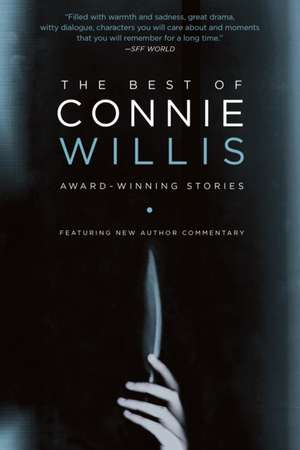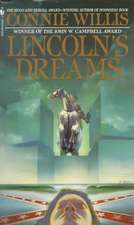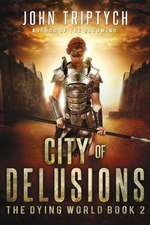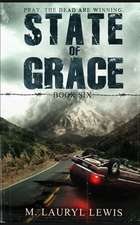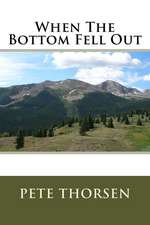The Best of Connie Willis: Award-Winning Stories
Autor Connie Willisen Limba Engleză Paperback – 21 apr 2014
Vezi toate premiile Carte premiată
Locus Awards (2014)
From a near future mourning the extinction of dogs to an alternate history in which invading aliens were defeated by none other than Emily Dickinson; from a madcap convention of bumbling quantum physicists in Hollywood to a London whose Underground has become a storehouse of intangible memories both foul and fair—here are the greatest stories of one of the greatest writers working in any genre today.
All ten of the stories gathered here are Hugo or Nebula award winners—some even have the distinction of winning both. With a new Introduction by the author and personal afterwords to each story—plus a special look at three of Willis’s unique public speeches—this is unquestionably the collection of the season, a book that every Connie Willis fan will treasure, and, to those unfamiliar with her work, the perfect introduction to one of the most accomplished and best-loved writers of our time.
Praise for The Best of Connie Willis
“Ranging from the hilarious to the profound, these stories show the full range of Willis’ talent for taut, dazzling plots, real science, memorable characters, penetrating dialogue and blistering drama—and may guide inquisitive readers toward her equally accomplished and acclaimed novels.”—Kirkus Reviews
“This anthology demolishes any attempt to pigeonhole SFWA Grand Master and Science Fiction Hall of Famer Willis. Her six Nebula Awards and ten Hugo Awards confirm her eminence in speculative fiction, but her versatile range and forthright wit wouldn’t be out of place in the literary mainstream.”—Publishers Weekly (starred review)
“In her humble and reflective introduction to this collection, spanning twenty-five years of Hugo and Nebula Awardߝwinning short fiction, Willis describes how she fell so ‘madly in love’ with sf short stories in her youth that she’s still writing them forty years later. Her passion comes through in the vision and variety represented in this collection, from haunting futures . . . to wryly funny portrayals of scientists, academics, and aliens. . . . This is the essential Willis collection.”—Booklist
“The Best of Connie Willis feels like an awfully short and spare title for such a wide-ranging imagination. After all, the ten stories in this collection include both one of the most poignant World War II time-travel tales and, I feel completely confident in writing this, the greatest alien-first-contact-at-Christmas story ever. . . . [Willis] is an excellent gateway writer for readers new to SFF. Her stories are about what people do when they find themselves in extreme, challenging or surprising situations. . . . Thank goodness [for] Connie Willis, who says many things that desperately need saying in more than one delightful way.”—Milwaukee Journal Sentinel
From the Hardcover edition.
Preț: 123.34 lei
Nou
Puncte Express: 185
Preț estimativ în valută:
23.60€ • 24.77$ • 19.59£
23.60€ • 24.77$ • 19.59£
Carte tipărită la comandă
Livrare economică 10-24 aprilie
Preluare comenzi: 021 569.72.76
Specificații
ISBN-13: 9780345540669
ISBN-10: 0345540662
Pagini: 496
Dimensiuni: 137 x 208 x 30 mm
Greutate: 0.38 kg
Editura: Del Rey Books
ISBN-10: 0345540662
Pagini: 496
Dimensiuni: 137 x 208 x 30 mm
Greutate: 0.38 kg
Editura: Del Rey Books
Recenzii
Praise for The Best of Connie Willis
“Ranging from the hilarious to the profound, these stories show the full range of Willis’ talent for taut, dazzling plots, real science, memorable characters, penetrating dialogue and blistering drama—and may guide inquisitive readers toward her equally accomplished and acclaimed novels.”—Kirkus Reviews
“This anthology demolishes any attempt to pigeonhole SFWA Grand Master and Science Fiction Hall of Famer Willis. Her six Nebula Awards and ten Hugo Awards confirm her eminence in speculative fiction, but her versatile range and forthright wit wouldn’t be out of place in the literary mainstream.”—Publishers Weekly (starred review)
“In her humble and reflective introduction to this collection, spanning twenty-five years of Hugo and Nebula Awardߝwinning short fiction, Willis describes how she fell so ‘madly in love’ with sf short stories in her youth that she’s still writing them forty years later. Her passion comes through in the vision and variety represented in this collection, from haunting futures . . . to wryly funny portrayals of scientists, academics, and aliens. . . . This is the essential Willis collection.”—Booklist
“The Best of Connie Willis feels like an awfully short and spare title for such a wide-ranging imagination. After all, the ten stories in this collection include both one of the most poignant World War II time-travel tales and, I feel completely confident in writing this, the greatest alien-first-contact-at-Christmas story ever. . . . [Willis] is an excellent gateway writer for readers new to SFF. Her stories are about what people do when they find themselves in extreme, challenging or surprising situations. . . . Thank goodness [for] Connie Willis, who says many things that desperately need saying in more than one delightful way.”—Milwaukee Journal Sentinel
Praise for Connie Willis
“A novelist who can plot like Agatha Christie and whose books possess a bounce and stylishness that Preston Sturges might envy.”—The Washington Post
“One of America’s finest writers . . . Willis can tell a story so packed with thrills, comedy, drama and a bit of red herring that the result is apt to satisfy the most discriminating, and hungry, reader.”—The Denver Post
“A wit with a common touch who’s read more great books, and makes better use of them in her work, than two or three lit professors put together.”—Newsday
“A national treasure.”—San Antonio Express-News
“Willis can tell a story like no other. . . . One of her specialties is sparkling, rapid-fire dialogue; another, suspenseful plotting; and yet another, dramatic scenes so fierce that they burn like after-images in the reader’s memory.”—The Village Voice
“Willis’s fiction is one of the most intelligent delights of our genre.”—Locus
From the Hardcover edition.
“Ranging from the hilarious to the profound, these stories show the full range of Willis’ talent for taut, dazzling plots, real science, memorable characters, penetrating dialogue and blistering drama—and may guide inquisitive readers toward her equally accomplished and acclaimed novels.”—Kirkus Reviews
“This anthology demolishes any attempt to pigeonhole SFWA Grand Master and Science Fiction Hall of Famer Willis. Her six Nebula Awards and ten Hugo Awards confirm her eminence in speculative fiction, but her versatile range and forthright wit wouldn’t be out of place in the literary mainstream.”—Publishers Weekly (starred review)
“In her humble and reflective introduction to this collection, spanning twenty-five years of Hugo and Nebula Awardߝwinning short fiction, Willis describes how she fell so ‘madly in love’ with sf short stories in her youth that she’s still writing them forty years later. Her passion comes through in the vision and variety represented in this collection, from haunting futures . . . to wryly funny portrayals of scientists, academics, and aliens. . . . This is the essential Willis collection.”—Booklist
“The Best of Connie Willis feels like an awfully short and spare title for such a wide-ranging imagination. After all, the ten stories in this collection include both one of the most poignant World War II time-travel tales and, I feel completely confident in writing this, the greatest alien-first-contact-at-Christmas story ever. . . . [Willis] is an excellent gateway writer for readers new to SFF. Her stories are about what people do when they find themselves in extreme, challenging or surprising situations. . . . Thank goodness [for] Connie Willis, who says many things that desperately need saying in more than one delightful way.”—Milwaukee Journal Sentinel
Praise for Connie Willis
“A novelist who can plot like Agatha Christie and whose books possess a bounce and stylishness that Preston Sturges might envy.”—The Washington Post
“One of America’s finest writers . . . Willis can tell a story so packed with thrills, comedy, drama and a bit of red herring that the result is apt to satisfy the most discriminating, and hungry, reader.”—The Denver Post
“A wit with a common touch who’s read more great books, and makes better use of them in her work, than two or three lit professors put together.”—Newsday
“A national treasure.”—San Antonio Express-News
“Willis can tell a story like no other. . . . One of her specialties is sparkling, rapid-fire dialogue; another, suspenseful plotting; and yet another, dramatic scenes so fierce that they burn like after-images in the reader’s memory.”—The Village Voice
“Willis’s fiction is one of the most intelligent delights of our genre.”—Locus
From the Hardcover edition.
Notă biografică
Connie Willis, a member of the Science Fiction Hall of Fame and a Grand Master of the Science Fiction and Fantasy Writers of America, has received seven Nebula awards and eleven Hugo awards for her fiction; Blackout and All Clear, a novel in two parts, won both. Her other works include Passage, Doomsday Book, Lincoln’s Dreams, Bellwether, Impossible Things, Remake, Uncharted Territory, To Say Nothing of the Dog, Fire Watch, and Miracle and Other Christmas Stories. Connie Willis lives in Colorado with her family.
Extras
A Letter from the Clearys
There was a letter from the Clearys at the post office. I put it in my backpack along with Mrs. Talbot's magazine and went outside to untie Stitch.
He had pulled his leash out as far as it would go and was sitting around the corner, half-strangled, watching a robin. Stitch never barks, not even at birds. He didn't even yip when Dad stitched up his paw. He just sat there the way we found him on the front porch, shivering a little and holding his paw up for Dad to look at. Mrs. Talbot says he's a terrible watchdog, but I'm glad he doesn't bark. Rusty barked all the time and look where it got him.
I had to pull Stitch back around the corner to where I could get enough slack to untie him. That took some doing because he really liked that robin. "It's a sign of spring, isn't it, fella?" I said, trying to get at the knot with my fingernails. I didn't loosen the knot, but I managed to break one of my fingernails off to the quick. Great. Mom will demand to know if I've noticed any other fingernails breaking.
My hands are a real mess. This winter I've gotten about a hundred burns on the back of my hands from that stupid woodstove of ours. One spot, just above my wrist, I keep burning over and over so it never has a chance to heal. The stove isn't big enough and when I try to jam a log in that's too long that same spot hits the inside of the stove every time. My stupid brother David won't saw them off to the right length. I've asked him and asked him to please cut them shorter, but he doesn't pay any attention to me.
I asked Mom if she would please tell him not to saw the logs so long, but she didn't. She never criticizes David. As far as she's concerned he can't do anything wrong just because he's twenty-three and was married.
"He does it on purpose," I told her. "He's hoping I'll burn to death."
"Paranoia is the number-one killer of fourteen-year-old girls," Mom said. She always says that. It makes me so mad I feel like killing her. "He doesn't do it on purpose. You need to be more careful with the stove, that's all." But all the time she was holding my hand and looking at the big burn that won't heal like it was a time bomb set to go off.
"We need a bigger stove," I said, and yanked my hand away. We do need a bigger one. Dad closed up the fireplace and put the woodstove in when the gas bill was getting out of sight, but it's just a little one because Mom didn't want one that would stick way out in the living room. Anyway, we were only going to use it in the evenings.
We won't get a new one. They are all too busy working on the stupid greenhouse. Maybe spring will come early, and my hand will have half a chance to heal. I know better. Last winter the snow kept up till the middle of June and this is only March. Stitch's robin is going to freeze his little tail if he doesn't head back south. Dad says that last year was unusual, that the weather will be back to normal this year, but he doesn't believe it, either, or he wouldn't be building the greenhouse.
As soon as I let go of Stitch's leash, he backed around the corner like a good boy and sat there waiting for me to stop sucking my finger and untie him. "We'd better get a move on," I told him. "Mom'll have a fit." I was supposed to go by the general store to try and get some tomato seeds, but the sun was already pretty far west, and I had at least a half hour's walk home. If I got home after dark I'd get sent to bed without supper and then I wouldn't get to read the letter. Besides, if I didn't go to the general store today they would have to let me go tomorrow and I wouldn't have to work on the stupid greenhouse.
Sometimes I feel like blowing it up. There's sawdust and mud on everything, and David dropped one of the pieces of plastic on the stove while they were cutting it and it melted onto the stove and stinks to high heaven. But nobody else even notices the mess, they're so busy talking about how wonderful it's going to be to have homegrown watermelon and corn and tomatoes next summer.
I don't see how it's going to be any different from last summer. The only things that came up at all were the lettuce and the potatoes. The lettuce was about as tall as my broken fingernail and the potatoes were as hard as rocks. Mrs. Talbot said it was the altitude, but Dad said it wasn't, either, it was the funny weather and this crummy Pikes Peak granite that passes for soil around here. He went up to the little library in the back of the general store and got a do-it-yourself book on greenhouses and started tearing everything up and now even Mrs. Talbot is crazy about the idea.
The other day I told them, "Paranoia is the number-one killer of people at this altitude," but they were too busy cutting slats and stapling plastic to even pay any attention to me.
Stitch walked along ahead of me, straining at his leash, and as soon as we were across the highway, I took it off. He never runs away like Rusty used to. Anyway, it's impossible to keep him out of the road, and the times I've tried keeping him on his leash, he dragged me out into the middle and I got in trouble with Dad over leaving footprints. So I keep to the frozen edges of the road, and he moseys along, stopping to sniff at potholes, and when he gets behind, I whistle at him and he comes running right up.
I walked pretty fast. It was getting chilly out, and I'd only worn my sweater. I stopped at the top of the hill and whistled at Stitch. We still had a mile to go. I could see the Peak from where I was standing. Maybe Dad is right about spring coming. There was hardly any snow on the Peak, and the burned part didn't look quite as dark as it did last fall, like maybe the trees are coming back.
Last year at this time the whole peak was solid white. I remember because that was when Dad and David and Mr. Talbot went hunting and it snowed every day and they didn't get back for almost a month. Mom just about went crazy before they got back. She kept going up to the road to watch for them even though the snow was five feet deep and she was leaving footprints as big as the Abominable Snowman's. She took Rusty with her even though he hated the snow about as much as Stitch hates the dark. And she took a gun. One time she tripped over a branch and fell down in the snow. She sprained her ankle and was frozen stiff by the time she made it back to the house. I felt like saying, "Paranoia is the number-one killer of mothers," but Mrs. Talbot butted in and said the next time I had to go with her and how this was what happened when people were allowed to go places by themselves, which meant me going to the post office. And I said I could take care of myself and Mom told me not to be rude to Mrs. Talbot and Mrs. Talbot was right, I should go with her the next time.
Mom wouldn't wait till her ankle was better. She bandaged it up and we went the very next day. She wouldn't say a word the whole trip, just limped through the snow. She never even looked up till we got to the road. The snow had stopped for a little while and the clouds had lifted enough so you could see the Peak. It was really neat, like a black and white photograph, the gray sky and the black trees and the white mountain. The Peak was completely covered with snow. You couldn't make out the toll road at all.
We were supposed to hike up the Peak with the Clearys.
When we got back to the house, I said, "The summer before last the Clearys never came."
Mom took off her mittens and stood by the stove, pulling off chunks of frozen snow. "Of course they didn't come, Lynn," she said.
Snow from my coat was dripping onto the stove and sizzling. "I didn't mean that," I said. "They were supposed to come the first week in June. Right after Rick graduated. So what happened? Did they just decide not to come or what?"
"I don't know," she said, pulling off her hat and shaking her hair out. Her bangs were all wet.
"Maybe they wrote to tell you they'd changed their plans," Mrs. Talbot said. "Maybe the post office lost the letter."
"It doesn't matter," Mom said.
"You'd think they'd have written or something," I said.
"Maybe the post office put the letter in somebody else's box," Mrs. Talbot said.
"It doesn't matter," Mom said, and went to hang her coat over the line in the kitchen. She wouldn't say another word about them. When Dad got home I asked him about the Clearys, too, but he was too busy telling about the trip to pay any attention to me.
Stitch didn't come. I whistled again and then started back after him. He was all the way at the bottom of the hill, his nose buried in something. "Come on," I said, and he turned around and then I could see why he hadn't come. He'd gotten himself tangled up in one of the electric wires that was down. He'd managed to get the cable wound around his legs like he does his leash sometimes and the harder he tried to get out, the more he got tangled up.
He was right in the middle of the road. I stood on the edge of the road, trying to figure out a way to get to him without leaving footprints. The road was pretty much frozen at the top of the hill, but down here snow was still melting and running across the road in big rivers. I put my toe out into the mud, and my sneaker sank in a good half inch, so I backed up, rubbed out the toe print with my hand, and wiped my hand on my jeans. I tried to think what to do. Dad is as paranoiac about footprints as Mom is about my hands, but he is even worse about my being out after dark. If I didn't make it back in time he might even tell me I couldn't go to the post office anymore.
Stitch was coming as close as he ever would to barking. He'd gotten the wire around his neck and was choking himself. "All right," I said, "I'm coming." I jumped out as far as I could into one of the rivers and then waded the rest of the way to Stitch, looking back a couple of times to make sure the water was washing away the footprints.
I unwound Stitch like you would a spool of thread, and threw the loose end of the wire over to the side of the road where it dangled from the pole, all ready to hang Stitch next time he comes along.
"You stupid dog," I said. "Now hurry!" and I sprinted back to the side of the road and up the hill in my sopping wet sneakers. He ran about five steps and stopped to sniff at a tree. "Come on!" I said. "It's getting dark. Dark!"
He was past me like a shot and halfway down the hill. Stitch is afraid of the dark. I know, there's no such thing in dogs. But Stitch really is. Usually I tell him, "Paranoia is the number-one killer of dogs," but right now I wanted him to hurry before my feet started to freeze. I started running, and we got to the bottom of the hill about the same time.
Stitch stopped at the driveway of the Talbots' house. Our house wasn't more than a few hundred feet from where I was standing, on the other side of the hill. Our house is down in kind of a well formed by hills on all sides. It's so deep and hidden you'd never even know it's there. You can't even see the smoke from our woodstove over the top of the Talbots' hill. There's a shortcut through the Talbots' property and down through the woods to our back door, but I don't take it anymore. "Dark, Stitch," I said sharply, and started running again. Stitch kept right at my heels.
The Peak was turning pink by the time I got to our driveway. Stitch peed on the spruce tree about a hundred times before I got it dragged back across the dirt driveway. It's a real big tree. Last summer Dad and David chopped it down and then made it look like it had fallen across the road. It completely covers up where the driveway meets the road, but the trunk is full of splinters, and I scraped my hand right in the same place as always. Great.
I made sure Stitch and I hadn't left any marks on the road (except for the marks he always leaves--another dog could find us in a minute. That's probably how Stitch showed up on our front porch, he smelled Rusty) and then got under cover of the hill as fast as I could. Stitch isn't the only one who gets nervous after dark. And besides, my feet were starting to hurt. Stitch was really paranoiac tonight. He didn't even take off running after we were in sight of the house.
David was outside, bringing in a load of wood. I could tell just by looking at it that they were all the wrong length. "Cutting it kind of close, aren't you?" he said. "Did you get the tomato seeds?"
"No," I said. "I brought you something else, though. I brought everybody something."
I went on in. Dad was rolling out plastic on the living room floor. Mrs. Talbot was holding one end for him. Mom was standing holding the card table, still folded up, waiting for them to finish so she could set it up in front of the stove for supper. Nobody even looked up. I unslung my backpack and took out Mrs. Talbot's magazine and the letter.
There was a letter from the Clearys at the post office. I put it in my backpack along with Mrs. Talbot's magazine and went outside to untie Stitch.
He had pulled his leash out as far as it would go and was sitting around the corner, half-strangled, watching a robin. Stitch never barks, not even at birds. He didn't even yip when Dad stitched up his paw. He just sat there the way we found him on the front porch, shivering a little and holding his paw up for Dad to look at. Mrs. Talbot says he's a terrible watchdog, but I'm glad he doesn't bark. Rusty barked all the time and look where it got him.
I had to pull Stitch back around the corner to where I could get enough slack to untie him. That took some doing because he really liked that robin. "It's a sign of spring, isn't it, fella?" I said, trying to get at the knot with my fingernails. I didn't loosen the knot, but I managed to break one of my fingernails off to the quick. Great. Mom will demand to know if I've noticed any other fingernails breaking.
My hands are a real mess. This winter I've gotten about a hundred burns on the back of my hands from that stupid woodstove of ours. One spot, just above my wrist, I keep burning over and over so it never has a chance to heal. The stove isn't big enough and when I try to jam a log in that's too long that same spot hits the inside of the stove every time. My stupid brother David won't saw them off to the right length. I've asked him and asked him to please cut them shorter, but he doesn't pay any attention to me.
I asked Mom if she would please tell him not to saw the logs so long, but she didn't. She never criticizes David. As far as she's concerned he can't do anything wrong just because he's twenty-three and was married.
"He does it on purpose," I told her. "He's hoping I'll burn to death."
"Paranoia is the number-one killer of fourteen-year-old girls," Mom said. She always says that. It makes me so mad I feel like killing her. "He doesn't do it on purpose. You need to be more careful with the stove, that's all." But all the time she was holding my hand and looking at the big burn that won't heal like it was a time bomb set to go off.
"We need a bigger stove," I said, and yanked my hand away. We do need a bigger one. Dad closed up the fireplace and put the woodstove in when the gas bill was getting out of sight, but it's just a little one because Mom didn't want one that would stick way out in the living room. Anyway, we were only going to use it in the evenings.
We won't get a new one. They are all too busy working on the stupid greenhouse. Maybe spring will come early, and my hand will have half a chance to heal. I know better. Last winter the snow kept up till the middle of June and this is only March. Stitch's robin is going to freeze his little tail if he doesn't head back south. Dad says that last year was unusual, that the weather will be back to normal this year, but he doesn't believe it, either, or he wouldn't be building the greenhouse.
As soon as I let go of Stitch's leash, he backed around the corner like a good boy and sat there waiting for me to stop sucking my finger and untie him. "We'd better get a move on," I told him. "Mom'll have a fit." I was supposed to go by the general store to try and get some tomato seeds, but the sun was already pretty far west, and I had at least a half hour's walk home. If I got home after dark I'd get sent to bed without supper and then I wouldn't get to read the letter. Besides, if I didn't go to the general store today they would have to let me go tomorrow and I wouldn't have to work on the stupid greenhouse.
Sometimes I feel like blowing it up. There's sawdust and mud on everything, and David dropped one of the pieces of plastic on the stove while they were cutting it and it melted onto the stove and stinks to high heaven. But nobody else even notices the mess, they're so busy talking about how wonderful it's going to be to have homegrown watermelon and corn and tomatoes next summer.
I don't see how it's going to be any different from last summer. The only things that came up at all were the lettuce and the potatoes. The lettuce was about as tall as my broken fingernail and the potatoes were as hard as rocks. Mrs. Talbot said it was the altitude, but Dad said it wasn't, either, it was the funny weather and this crummy Pikes Peak granite that passes for soil around here. He went up to the little library in the back of the general store and got a do-it-yourself book on greenhouses and started tearing everything up and now even Mrs. Talbot is crazy about the idea.
The other day I told them, "Paranoia is the number-one killer of people at this altitude," but they were too busy cutting slats and stapling plastic to even pay any attention to me.
Stitch walked along ahead of me, straining at his leash, and as soon as we were across the highway, I took it off. He never runs away like Rusty used to. Anyway, it's impossible to keep him out of the road, and the times I've tried keeping him on his leash, he dragged me out into the middle and I got in trouble with Dad over leaving footprints. So I keep to the frozen edges of the road, and he moseys along, stopping to sniff at potholes, and when he gets behind, I whistle at him and he comes running right up.
I walked pretty fast. It was getting chilly out, and I'd only worn my sweater. I stopped at the top of the hill and whistled at Stitch. We still had a mile to go. I could see the Peak from where I was standing. Maybe Dad is right about spring coming. There was hardly any snow on the Peak, and the burned part didn't look quite as dark as it did last fall, like maybe the trees are coming back.
Last year at this time the whole peak was solid white. I remember because that was when Dad and David and Mr. Talbot went hunting and it snowed every day and they didn't get back for almost a month. Mom just about went crazy before they got back. She kept going up to the road to watch for them even though the snow was five feet deep and she was leaving footprints as big as the Abominable Snowman's. She took Rusty with her even though he hated the snow about as much as Stitch hates the dark. And she took a gun. One time she tripped over a branch and fell down in the snow. She sprained her ankle and was frozen stiff by the time she made it back to the house. I felt like saying, "Paranoia is the number-one killer of mothers," but Mrs. Talbot butted in and said the next time I had to go with her and how this was what happened when people were allowed to go places by themselves, which meant me going to the post office. And I said I could take care of myself and Mom told me not to be rude to Mrs. Talbot and Mrs. Talbot was right, I should go with her the next time.
Mom wouldn't wait till her ankle was better. She bandaged it up and we went the very next day. She wouldn't say a word the whole trip, just limped through the snow. She never even looked up till we got to the road. The snow had stopped for a little while and the clouds had lifted enough so you could see the Peak. It was really neat, like a black and white photograph, the gray sky and the black trees and the white mountain. The Peak was completely covered with snow. You couldn't make out the toll road at all.
We were supposed to hike up the Peak with the Clearys.
When we got back to the house, I said, "The summer before last the Clearys never came."
Mom took off her mittens and stood by the stove, pulling off chunks of frozen snow. "Of course they didn't come, Lynn," she said.
Snow from my coat was dripping onto the stove and sizzling. "I didn't mean that," I said. "They were supposed to come the first week in June. Right after Rick graduated. So what happened? Did they just decide not to come or what?"
"I don't know," she said, pulling off her hat and shaking her hair out. Her bangs were all wet.
"Maybe they wrote to tell you they'd changed their plans," Mrs. Talbot said. "Maybe the post office lost the letter."
"It doesn't matter," Mom said.
"You'd think they'd have written or something," I said.
"Maybe the post office put the letter in somebody else's box," Mrs. Talbot said.
"It doesn't matter," Mom said, and went to hang her coat over the line in the kitchen. She wouldn't say another word about them. When Dad got home I asked him about the Clearys, too, but he was too busy telling about the trip to pay any attention to me.
Stitch didn't come. I whistled again and then started back after him. He was all the way at the bottom of the hill, his nose buried in something. "Come on," I said, and he turned around and then I could see why he hadn't come. He'd gotten himself tangled up in one of the electric wires that was down. He'd managed to get the cable wound around his legs like he does his leash sometimes and the harder he tried to get out, the more he got tangled up.
He was right in the middle of the road. I stood on the edge of the road, trying to figure out a way to get to him without leaving footprints. The road was pretty much frozen at the top of the hill, but down here snow was still melting and running across the road in big rivers. I put my toe out into the mud, and my sneaker sank in a good half inch, so I backed up, rubbed out the toe print with my hand, and wiped my hand on my jeans. I tried to think what to do. Dad is as paranoiac about footprints as Mom is about my hands, but he is even worse about my being out after dark. If I didn't make it back in time he might even tell me I couldn't go to the post office anymore.
Stitch was coming as close as he ever would to barking. He'd gotten the wire around his neck and was choking himself. "All right," I said, "I'm coming." I jumped out as far as I could into one of the rivers and then waded the rest of the way to Stitch, looking back a couple of times to make sure the water was washing away the footprints.
I unwound Stitch like you would a spool of thread, and threw the loose end of the wire over to the side of the road where it dangled from the pole, all ready to hang Stitch next time he comes along.
"You stupid dog," I said. "Now hurry!" and I sprinted back to the side of the road and up the hill in my sopping wet sneakers. He ran about five steps and stopped to sniff at a tree. "Come on!" I said. "It's getting dark. Dark!"
He was past me like a shot and halfway down the hill. Stitch is afraid of the dark. I know, there's no such thing in dogs. But Stitch really is. Usually I tell him, "Paranoia is the number-one killer of dogs," but right now I wanted him to hurry before my feet started to freeze. I started running, and we got to the bottom of the hill about the same time.
Stitch stopped at the driveway of the Talbots' house. Our house wasn't more than a few hundred feet from where I was standing, on the other side of the hill. Our house is down in kind of a well formed by hills on all sides. It's so deep and hidden you'd never even know it's there. You can't even see the smoke from our woodstove over the top of the Talbots' hill. There's a shortcut through the Talbots' property and down through the woods to our back door, but I don't take it anymore. "Dark, Stitch," I said sharply, and started running again. Stitch kept right at my heels.
The Peak was turning pink by the time I got to our driveway. Stitch peed on the spruce tree about a hundred times before I got it dragged back across the dirt driveway. It's a real big tree. Last summer Dad and David chopped it down and then made it look like it had fallen across the road. It completely covers up where the driveway meets the road, but the trunk is full of splinters, and I scraped my hand right in the same place as always. Great.
I made sure Stitch and I hadn't left any marks on the road (except for the marks he always leaves--another dog could find us in a minute. That's probably how Stitch showed up on our front porch, he smelled Rusty) and then got under cover of the hill as fast as I could. Stitch isn't the only one who gets nervous after dark. And besides, my feet were starting to hurt. Stitch was really paranoiac tonight. He didn't even take off running after we were in sight of the house.
David was outside, bringing in a load of wood. I could tell just by looking at it that they were all the wrong length. "Cutting it kind of close, aren't you?" he said. "Did you get the tomato seeds?"
"No," I said. "I brought you something else, though. I brought everybody something."
I went on in. Dad was rolling out plastic on the living room floor. Mrs. Talbot was holding one end for him. Mom was standing holding the card table, still folded up, waiting for them to finish so she could set it up in front of the stove for supper. Nobody even looked up. I unslung my backpack and took out Mrs. Talbot's magazine and the letter.
Premii
- Locus Awards Winner, 2014
